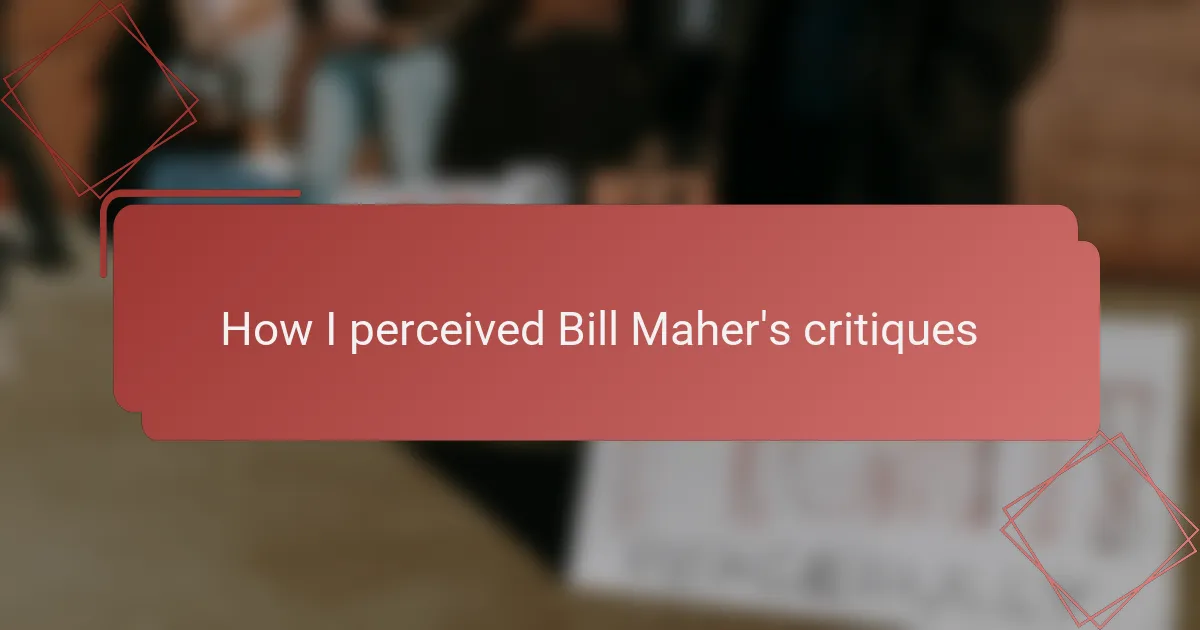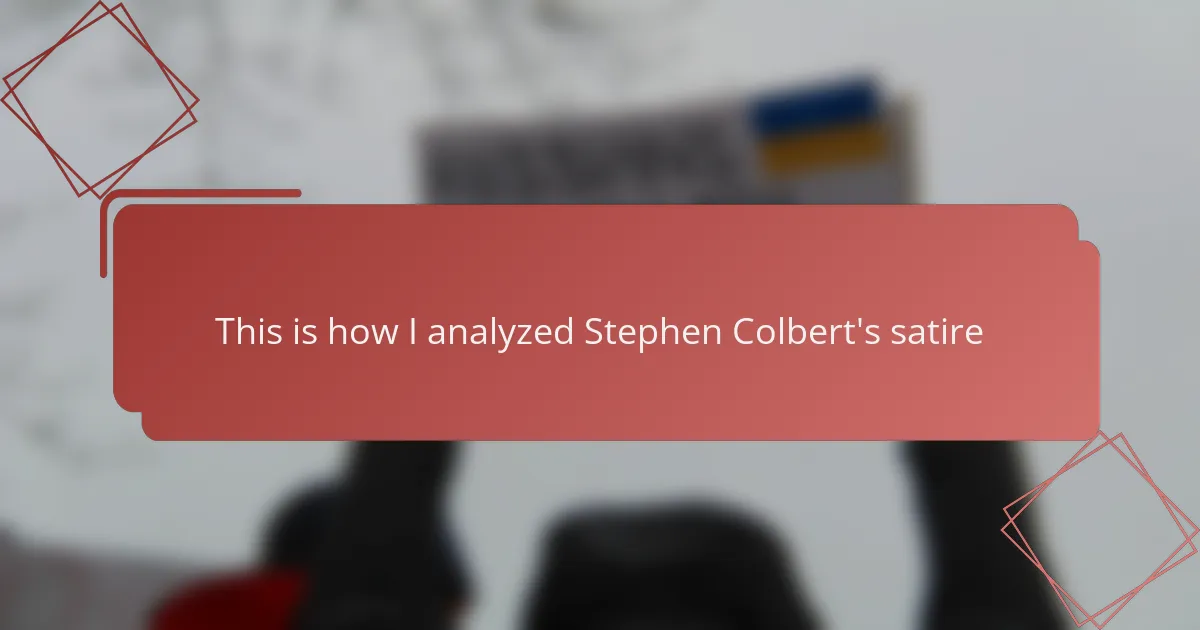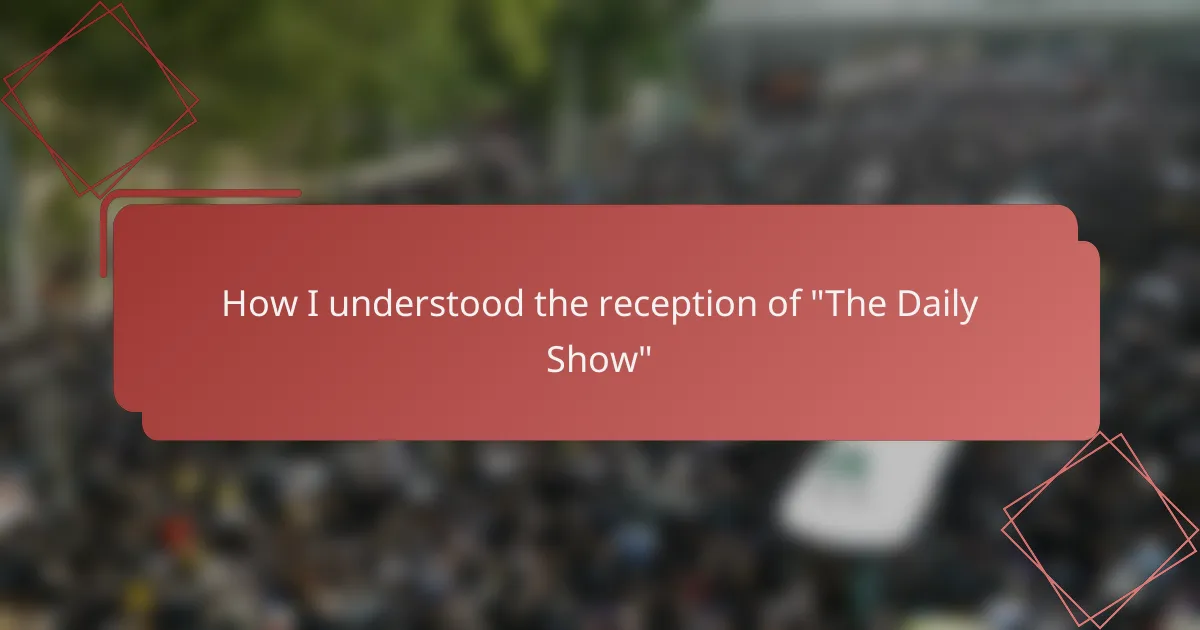Key takeaways
- Political satire serves as a tool for questioning authority and challenging the status quo through humor and insight.
- Jon Stewart’s unique style balances sharp critique with empathy, making complex political issues relatable and thought-provoking.
- His use of irony and personal anecdotes creates a conversation that encourages critical thinking and reflection on media and political narratives.
- Stewart’s techniques in satire inspire others to engage more thoughtfully with political discourse while fostering a sense of community among audiences.

Understanding political satire fundamentals
Political satire, at its core, is a way to question authority and expose flaws through humor. Have you ever caught yourself laughing at a joke that made you think twice about a politician’s actions? That moment, to me, defines the power of satire.
What makes political satire so unique is its blend of wit and critique—it’s not just about getting a laugh but prompting reflection. In my experience, the best satire doesn’t feel preachy; it hooks you with humor and then quietly delivers a sharp insight.
Understanding its fundamentals means recognizing satire as a tool that challenges the status quo without resorting to direct confrontation. It’s a dance between subtlety and boldness, something I’ve always found both thrilling and thought-provoking.
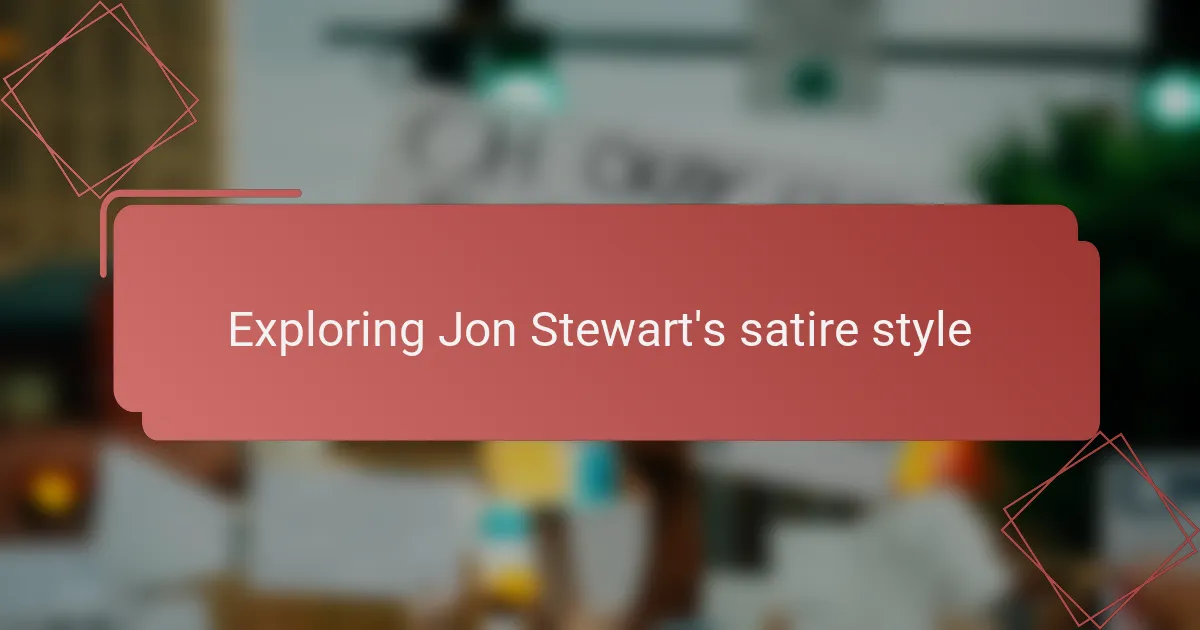
Exploring Jon Stewart’s satire style
Jon Stewart’s satire style stands out to me because of its sharp wit combined with genuine empathy. When I first watched his monologues, I noticed how he could tear apart political absurdities while still connecting on a human level, making me laugh and think simultaneously. This balance is what made his humor feel both biting and respectful, a rare feat in political satire.
What impresses me most is how he uses sarcasm not just for humor but as a tool to highlight the flaws in media and politics, often exposing uncomfortable truths. From my experience, his ability to make complex issues digestible without dumbing them down keeps me engaged and often shifts my perspective.
- Uses irony and sarcasm to reveal political hypocrisy
- Balances humor with insightful social commentary
- Employs personal anecdotes to deepen emotional impact
- Challenges mainstream media narratives through satire
- Creates a conversational tone that invites viewers to reflect
- Maintains empathy despite harsh critiques, avoiding cruelty

Key themes in Jon Stewart’s humor
One thing I’ve consistently noticed in Jon Stewart’s humor is his relentless focus on political hypocrisy. He has this uncanny ability to spotlight contradictions in a way that’s both hilarious and deeply frustrating, making me question how certain political narratives hold up under scrutiny. Have you ever laughed out loud while feeling a bit uncomfortable because you recognized a truth you hadn’t wanted to face? That’s exactly the space Stewart thrives in.
Another theme that struck me is his clever use of irony to dissect the media’s role in shaping political discourse. Watching him, I often felt like he was peeling back layers of spin and revealing just how flawed mainstream coverage can be. It’s not just about the jokes—you come away understanding how media bias influences public perception, which in my experience, is both eye-opening and unsettling.
What truly sets Stewart apart, though, is his balance of empathy with critique. I remember feeling genuinely moved when he shared personal stories within his satire, reminding me that behind the politics and headlines are real human experiences. His humor isn’t just snarky—it invites us to care and think, which, to me, makes his satire much more powerful and lasting.
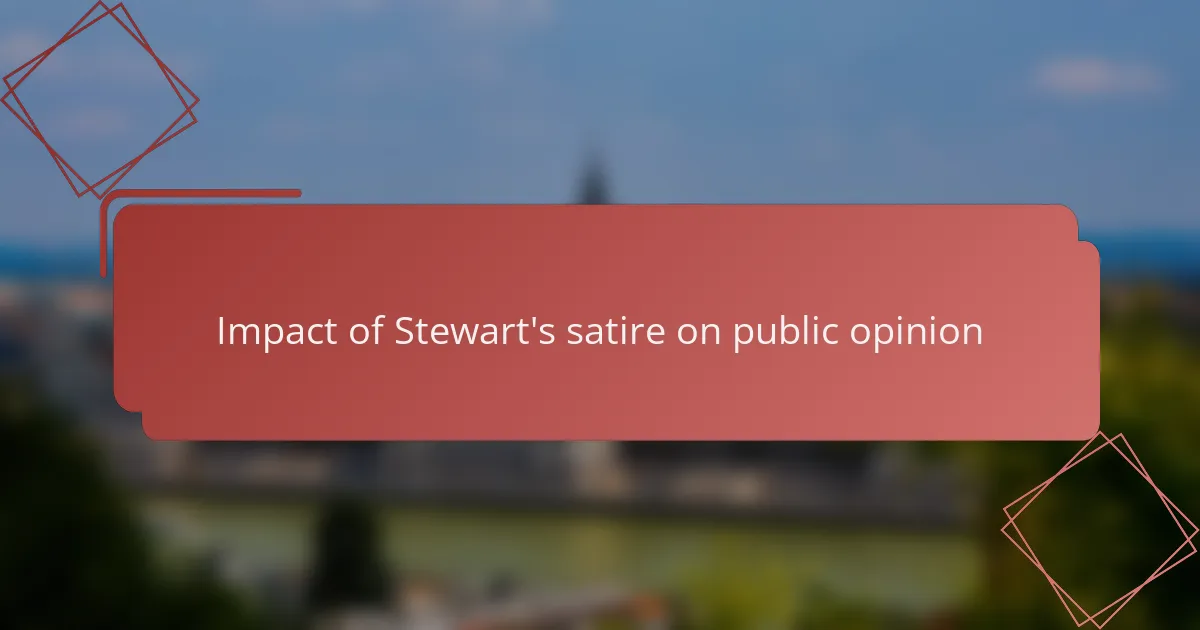
Impact of Stewart’s satire on public opinion
Jon Stewart’s satire had a tangible effect on how I, and many others, perceived political issues. His sharp wit broke down complex topics into relatable commentary, making it easier to digest and even challenge prevailing narratives. I remember feeling both enlightened and entertained, which wasn’t something I expected from political discourse before encountering his work.
Thinking back, his humor didn’t just make me laugh; it shifted my conversations with friends and family. It encouraged me to question media biases and seek out multiple perspectives, blending skepticism with humor. Here’s what I found most impactful about Stewart’s satire on public opinion:
- Simplified complex political issues without dumbing them down
- Highlighted hypocrisy and contradictions in powerful institutions
- Encouraged critical thinking over blind acceptance
- Fostered a community that discussed politics openly and humorously
- Influenced public discourse by blending facts with comedic timing
These elements combined to create a unique space where political engagement felt accessible and even enjoyable.
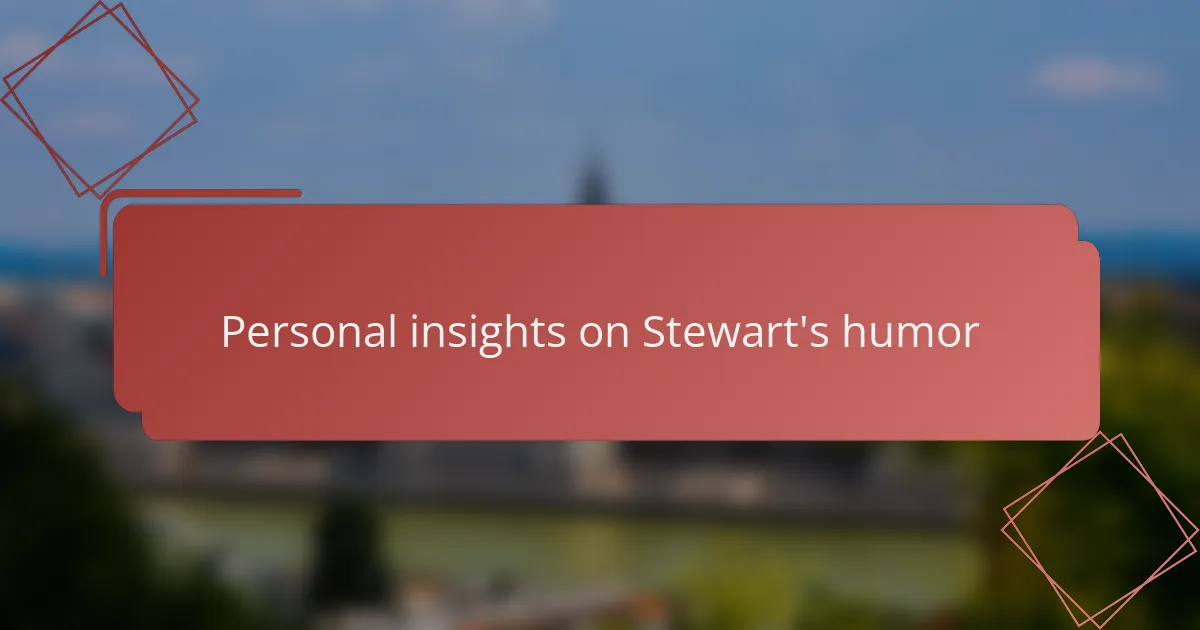
Personal insights on Stewart’s humor
What I find most striking about Jon Stewart’s humor is how effortlessly it combines sharp critique with a genuine warmth that never feels mean-spirited. Have you ever noticed that rare kind of laughter that leaves you both amused and thoughtfully unsettled? That’s how his humor always hits me—inviting me to rethink my assumptions without pushing me away.
There was this one episode where Stewart’s biting sarcasm about media bias felt so spot-on it actually made me pause my binge-watching and reflect on the news I consume daily. His humor isn’t just about mocking politicians; it challenges me to look deeper and question the information I normally take at face value. That moment stuck with me because it wasn’t just funny—it was transformative.
I also appreciate how Stewart weaves personal stories into his satire, which makes the humor feel less like an attack and more like a conversation among friends. It’s this blend of empathy and incisiveness that makes his style resonate on such a personal level for me. Doesn’t humor become far more impactful when you feel the person behind the joke truly understands the complexity of the issues? For me, that’s the hallmark of Stewart’s approach.
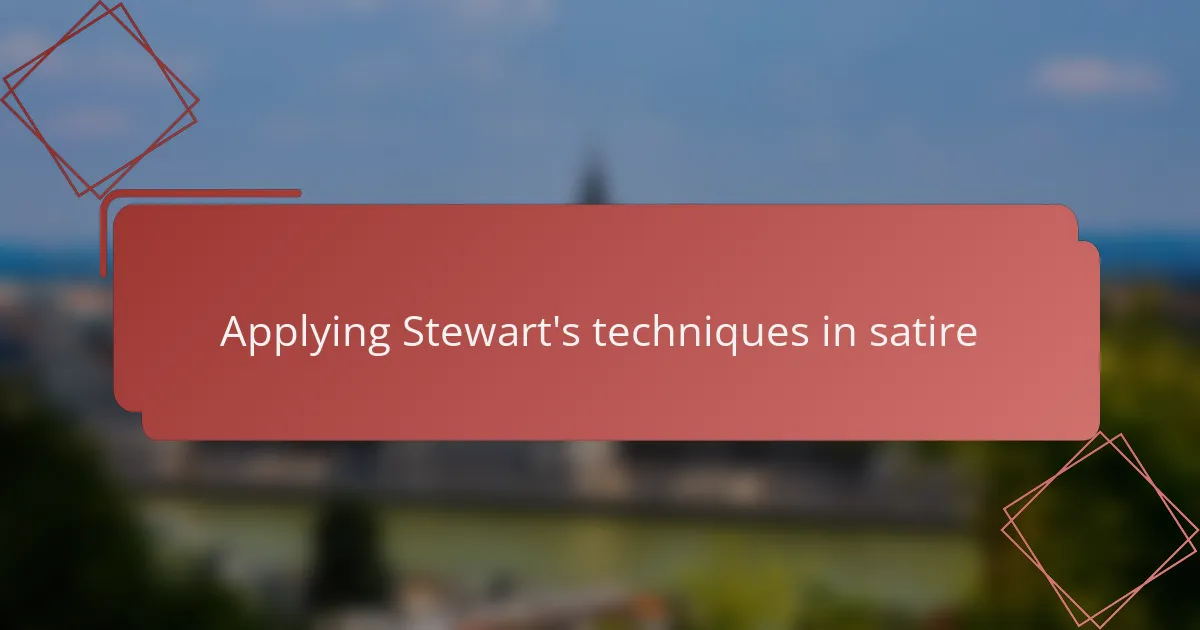
Applying Stewart’s techniques in satire
Jon Stewart’s skillful use of irony and timing has always stood out to me when trying to craft effective political satire. I remember once attempting to mimic his approach during a community debate, and the impact of a well-placed pause combined with a subtle ironic remark truly shifted the atmosphere, making the critique hit harder without coming off as aggressive.
From my experience, Stewart’s techniques lean heavily on blending sharp wit with a clear message, which keeps the audience both entertained and thoughtful. Here are some key methods I found most impactful:
- Using irony to highlight contradictions in political statements or actions
- Timing pauses to let the humor sink in before delivering the punchline
- Incorporating relatable, everyday language to connect with the audience
- Balancing humor with factual accuracy to maintain credibility
- Leveraging self-deprecation to build trust and soften critiques
- Framing satire so it invites reflection rather than just laughter
Applying these tactics has helped me refine my satirical voice in a way that feels authentic and impactful.
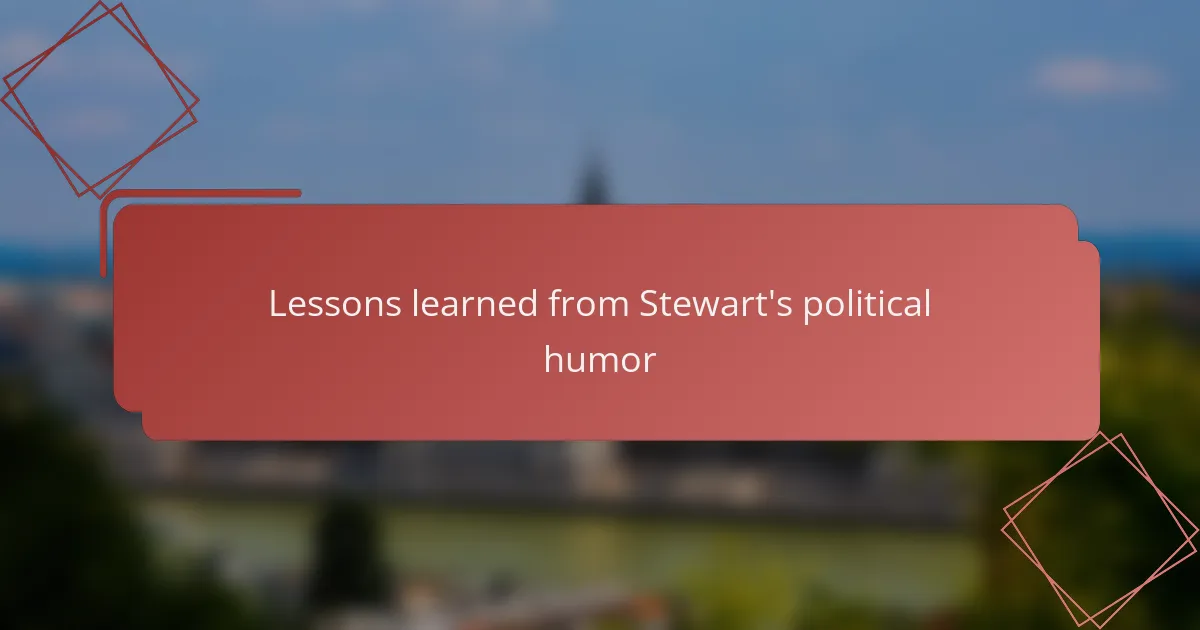
Lessons learned from Stewart’s political humor
Lessons learned from Stewart’s political humor go beyond just laughter; I realized how powerful wit can be in breaking down complex issues. His ability to blend satire with sharp political critique taught me to question authority while still engaging critically and thoughtfully. I remember watching his segments during heated political moments, and his humor helped me stay grounded amid frustration.
| Aspect | What I Learned |
|---|---|
| Engagement | Humor makes political topics accessible and keeps the audience interested. |
| Critical Thinking | Stewart’s satire encourages questioning narratives and looking deeper into political motives. |
| Emotional Balance | His humor provided relief during tense political times, helping me process complex emotions. |

